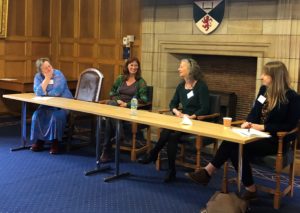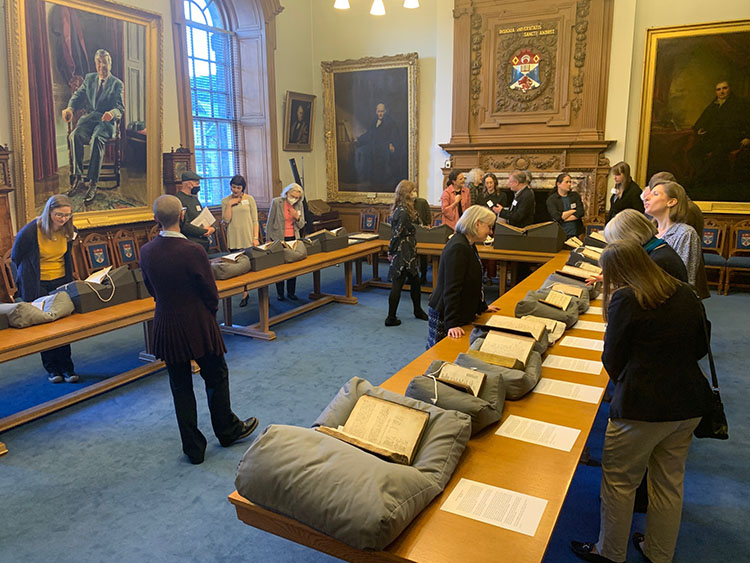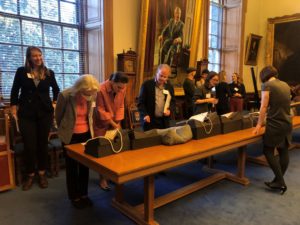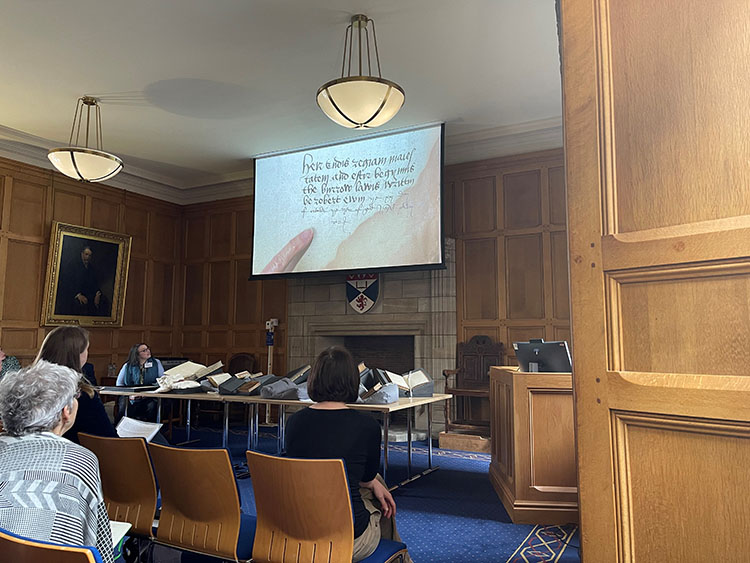Folger Symposium – ‘Reading Scotland before 1707’
On the weekend of 6-8 May the University hosted a Folger Symposium on ‘Reading Scotland before 1707’.  This was the culmination of four years of preparation by Professor Margaret Connolly and Professor Rhiannon Purdie, Dr Harriet Archer and Dr Jane Pettegree. Hailed by the Head of the School of English as “a spectacularly successful and beautifully organised event run in conjunction with colleagues in the Folger Shakespeare Library”, the weekend brought together an invited audience of international scholars and interdisciplinary specialists from post-graduates to professors, and the University Collections were central to the event.
This was the culmination of four years of preparation by Professor Margaret Connolly and Professor Rhiannon Purdie, Dr Harriet Archer and Dr Jane Pettegree. Hailed by the Head of the School of English as “a spectacularly successful and beautifully organised event run in conjunction with colleagues in the Folger Shakespeare Library”, the weekend brought together an invited audience of international scholars and interdisciplinary specialists from post-graduates to professors, and the University Collections were central to the event.

After the welcome and plenary addresses, the first of which was given by Professor Sally Mapstone, Principal of the University of St Andrews and distinguished specialist in literature written in Scotland before 1707, participants were invited to visit the display of University Collections materials. This had been set out in the Senate Room, on the same landing as the King James Library which was also open for visitors. Elizabeth Henderson and Rachel Hart put together a display which picked up many of the themes to be discussed during the weekend and which stimulated much interest and even excitement from the delegates. Some visitors even missed the wine reception, to stay at the exhibition and browse at leisure!

The links between Scotland and Europe and the significance of the importing of printed books from the Low Countries was picked up in the display, with a volume of tracts of Archbishop William Scheves (Typ NL.A85JT). That strand re-emerged in the presentation by Professor Andrew Pettegree on the Dutch book trade later in the weekend. The first complete translation of the Aeneid into a form of English based on the Paris edition by the humanist scholar printer Badius Ascensius was authored by alumnus Gavin Douglas and we had an early edition of 13 bukes of Eneados of the famose poete Virgill on show. The theme on Literature, Scots Law and the Written Record enabled us to display our manuscripts of the Regiam Maiestatem, along with the first printed edition of the text. Other highlights included a manuscript of the poems of John Johnson (msPA7300.J7), and of a mathematical treatise by John Geddy (msQA33.G4), some of the earliest books printed in St Andrews, chronicles by Andrew of Wyntoun and Robert Lindsay of Pitscottie, Blaeu’s Atlas Novus showing Fife, an early anthology of neo-Latin poetry (Delitiae poetarum Scotorum, 1637 and Andrew Melville’s copy of Buchanan’s Rerum Scoticarum historia (1582). Attendees were interested to see the earliest of seven theses theologicae (pamphlets printed for the formal disputation at the end of the theology course) to have survived from Andrew Melville’s time as Principal of St Mary’s. These are the earliest extant evidence of theological teaching at St Andrews, and in fact the earliest detailed examples from any Scottish university (Typ BE.B95W). The physical location of the symposium within the seventeenth century Parliament Hall and the association of the space with King James VI and I added to the impact of the event.
The format of the symposium was unlike the ‘normal’ academic conference. Rather, the sessions were hosted by a small panel who each made very short presentations to introduce their theme. There was then extensive unstructured time for discussion, exploration of ideas and following of trains of thought. This provided a rich forum for the offering of expert insights into questions being raised and there was no reluctance amongst those present in offering their opinions. The relaxed and convivial atmosphere enabled all participants to feel comfortable. The afternoon session on the Saturday was focussed on The Scottish Book in Manuscript and Print. Hosted by Professor Andrew Pettegree, Professor Emily Wingfield from Birmingham and Dr Helen Vincent from the National Library of Scotland, this provoked a wide-ranging discussion and was illustrated by a further selection of books and manuscripts from the University Collections. We made very effective use of the visualiser to illustrate the points being made. This enabled all to see the material and we were able to point out particularly relevant features as the conversation evolved.

An additional feature of the weekend was the performance of a dramatic reading, with music, of The Mous and the Lyon, a new short story by local author Shirley McKay, author of the Hew Cullan Mysteries, with music by Bill Taylor on harp and members of the St Andrews Renaissance Singers. This was a one-off presentation, introduced by Bill as the sort of entertainment that might have been offered to guests in a Scottish noble’s household in the 17th century. We enjoyed this in the glorious acoustic of the MacPherson Recital Room in the Laidlaw Music Centre.
On Sunday there was a fascinating discussion on Scotland on Stage and a focus on the household, court and patronage, which included a reflection by Georgianna Ziegler, Reference Librarian Emerita of the Folger, on Esther Inglis, calligrapher and creator of a hand-crafted miniature book (ms38830) which had been on display on Friday. The afternoon concluded with another dynamic engagement with Reformed Scottish Literature, from psalms and sermons to the reshaping of the national identity through the national covenant. In his inimical fashion, Jamie Reid Baxter delivered his presentation in Scots, perhaps encapsulating the way in which the weekend had enabled a revisiting and re-imagining of the culture and history of the sixteenth and seventeenth century Scotland.
Rachel Hart
Senior Archivist (Keeper of Manuscripts and Muniments)
I wonder whether the University Library's copy of the earliest known pack of Scottish playing cards was on display or discussed. It dates from 1691 and was probably printed at Canonmills in Edinburgh by Peter Bruschi (anglicised to Bruce) from Flanders (another connection with the Low Countries). Bruschi was also responsible for bringing the first public water supply to Edinburgh.
Dear Roddy, thanks for your comment. The playing cards were not part of the display. They would have made an interesting addition to the event though. We will be sure to keep them in mind for events on similar themes in the future.